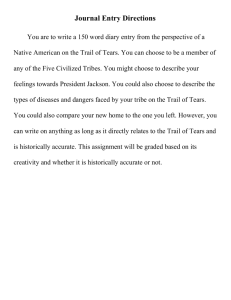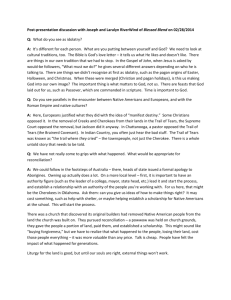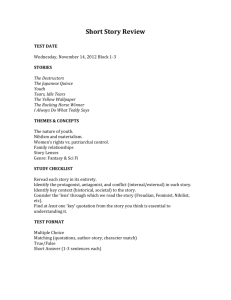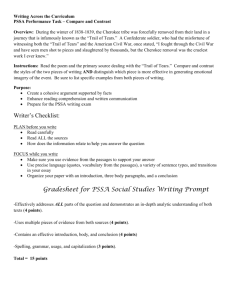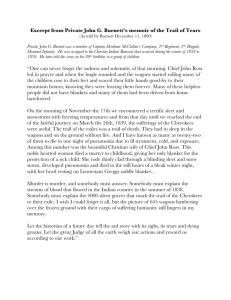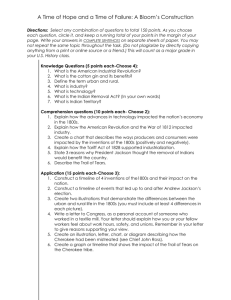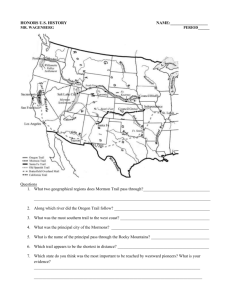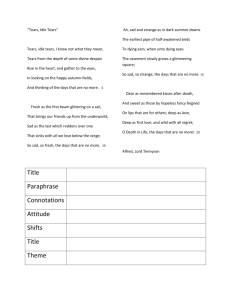Trail of Tears Handout Back
advertisement
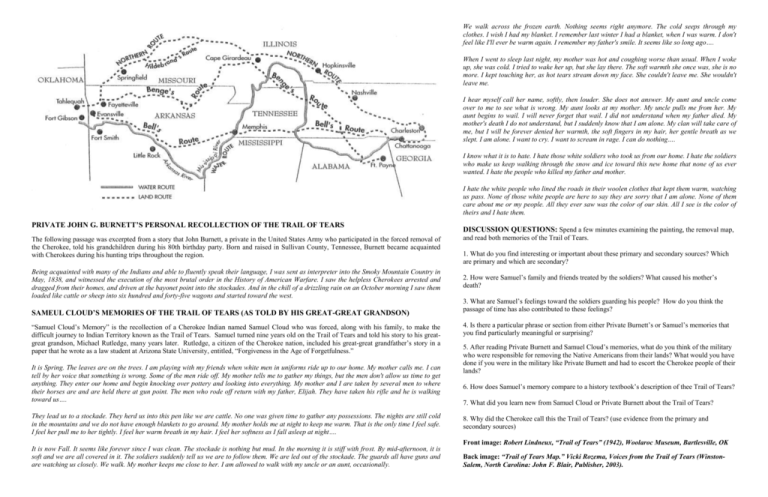
We walk across the frozen earth. Nothing seems right anymore. The cold seeps through my clothes. I wish I had my blanket. I remember last winter I had a blanket, when I was warm. I don't feel like I'll ever be warm again. I remember my father's smile. It seems like so long ago…. When I went to sleep last night, my mother was hot and coughing worse than usual. When I woke up, she was cold. I tried to wake her up, but she lay there. The soft warmth she once was, she is no more. I kept touching her, as hot tears stream down my face. She couldn't leave me. She wouldn't leave me. I hear myself call her name, softly, then louder. She does not answer. My aunt and uncle come over to me to see what is wrong. My aunt looks at my mother. My uncle pulls me from her. My aunt begins to wail. I will never forget that wail. I did not understand when my father died. My mother's death I do not understand, but I suddenly know that I am alone. My clan will take care of me, but I will be forever denied her warmth, the soft fingers in my hair, her gentle breath as we slept. I am alone. I want to cry. I want to scream in rage. I can do nothing…. I know what it is to hate. I hate those white soldiers who took us from our home. I hate the soldiers who make us keep walking through the snow and ice toward this new home that none of us ever wanted. I hate the people who killed my father and mother. I hate the white people who lined the roads in their woolen clothes that kept them warm, watching us pass. None of those white people are here to say they are sorry that I am alone. None of them care about me or my people. All they ever saw was the color of our skin. All I see is the color of theirs and I hate them. PRIVATE JOHN G. BURNETT’S PERSONAL RECOLLECTION OF THE TRAIL OF TEARS The following passage was excerpted from a story that John Burnett, a private in the United States Army who participated in the forced removal of the Cherokee, told his grandchildren during his 80th birthday party. Born and raised in Sullivan County, Tennessee, Burnett became acquainted with Cherokees during his hunting trips throughout the region. Being acquainted with many of the Indians and able to fluently speak their language, I was sent as interpreter into the Smoky Mountain Country in May, 1838, and witnessed the execution of the most brutal order in the History of American Warfare. I saw the helpless Cherokees arrested and dragged from their homes, and driven at the bayonet point into the stockades. And in the chill of a drizzling rain on an October morning I saw them loaded like cattle or sheep into six hundred and forty-five wagons and started toward the west. SAMEUL CLOUD’S MEMORIES OF THE TRAIL OF TEARS (AS TOLD BY HIS GREAT-GREAT GRANDSON) “Samuel Cloud’s Memory” is the recollection of a Cherokee Indian named Samuel Cloud who was forced, along with his family, to make the difficult journey to Indian Territory known as the Trail of Tears. Samuel turned nine years old on the Trail of Tears and told his story to his greatgreat grandson, Michael Rutledge, many years later. Rutledge, a citizen of the Cherokee nation, included his great-great grandfather’s story in a paper that he wrote as a law student at Arizona State University, entitled, “Forgiveness in the Age of Forgetfulness.” It is Spring. The leaves are on the trees. I am playing with my friends when white men in uniforms ride up to our home. My mother calls me. I can tell by her voice that something is wrong. Some of the men ride off. My mother tells me to gather my things, but the men don't allow us time to get anything. They enter our home and begin knocking over pottery and looking into everything. My mother and I are taken by several men to where their horses are and are held there at gun point. The men who rode off return with my father, Elijah. They have taken his rifle and he is walking toward us…. They lead us to a stockade. They herd us into this pen like we are cattle. No one was given time to gather any possessions. The nights are still cold in the mountains and we do not have enough blankets to go around. My mother holds me at night to keep me warm. That is the only time I feel safe. I feel her pull me to her tightly. I feel her warm breath in my hair. I feel her softness as I fall asleep at night…. It is now Fall. It seems like forever since I was clean. The stockade is nothing but mud. In the morning it is stiff with frost. By mid-afternoon, it is soft and we are all covered in it. The soldiers suddenly tell us we are to follow them. We are led out of the stockade. The guards all have guns and are watching us closely. We walk. My mother keeps me close to her. I am allowed to walk with my uncle or an aunt, occasionally. DISCUSSION QUESTIONS: Spend a few minutes examining the painting, the removal map, and read both memories of the Trail of Tears. 1. What do you find interesting or important about these primary and secondary sources? Which are primary and which are secondary? 2. How were Samuel’s family and friends treated by the soldiers? What caused his mother’s death? 3. What are Samuel’s feelings toward the soldiers guarding his people? How do you think the passage of time has also contributed to these feelings? 4. Is there a particular phrase or section from either Private Burnett’s or Samuel’s memories that you find particularly meaningful or surprising? 5. After reading Private Burnett and Samuel Cloud’s memories, what do you think of the military who were responsible for removing the Native Americans from their lands? What would you have done if you were in the military like Private Burnett and had to escort the Cherokee people of their lands? 6. How does Samuel’s memory compare to a history textbook’s description of thee Trail of Tears? 7. What did you learn new from Samuel Cloud or Private Burnett about the Trail of Tears? 8. Why did the Cherokee call this the Trail of Tears? (use evidence from the primary and secondary sources) Front image: Robert Lindneux, “Trail of Tears” (1942), Woolaroc Museum, Bartlesville, OK Back image: “Trail of Tears Map.” Vicki Rozema, Voices from the Trail of Tears (WinstonSalem, North Carolina: John F. Blair, Publisher, 2003).
